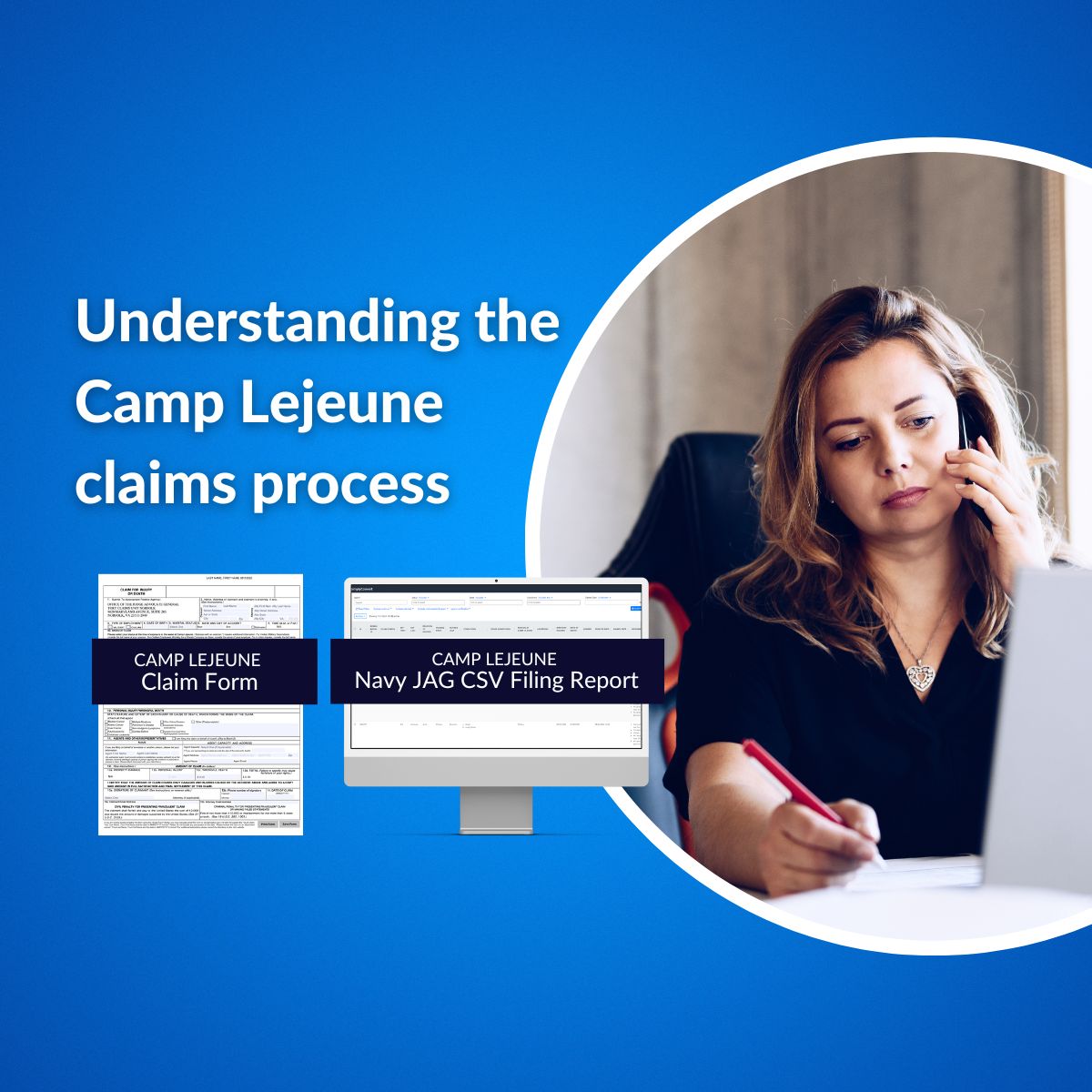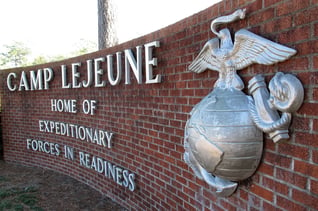What lawyers need to know about the Camp Lejeune claim filing process

Contents
For decades, victims of Camp Lejeune water contamination have attempted to receive justice and compensation for their injuries and diagnoses. With the Camp Lejeune Justice Act, a path forward is now visible for these victims, and attorneys are able to help them secure rightfully owed compensation.
The filing process for Camp Lejeune claims is unprecedented, and attorneys must be hyper-aware of the work that goes into both filing claim forms and following up if a claim is denied.
In this blog, we discuss the filing process for Camp Lejeune claims and how SimplyConvert makes it easy for law firms to assist their Camp Lejeune clients.
The Administrative Process for Camp Lejeune Claims: The CLJA Claim Form
The initial step for filing Camp Lejeune claims is the administrative process.
The administrative process involves filling out and submitting a Camp Lejeune Justice Act (CLJA) Claim Form. The claim form must be filed within two years from the date the Honoring Our PACT Act was signed into law: August 10th, 2022.
The claim is submitted to the Office of the Judge Advocate General (JAG) of the Navy Tort Claims Unit (TCU), either as a PDF form for each individual client or for multiple clients in a .csv file.
The qualified individual, if filing without the help of a law firm, will receive an email from the TCU with either a receipt for the claim or an explanation as to why a claim was not valid or accepted.
The TCU has 6 months from the date of submission to adjudicate or deny the claim. If the TCU denies a claim, the claimant has the opportunity to substantiate the claim or file suit in the US District Court: Eastern District of North Carolina.
What is on the Camp Lejeune Justice Act (CLJA) Claim Form?
The CLJA Claim Form is written to give victims the benefit of the doubt when it comes to their diagnoses and injuries as they relate to water contamination at the North Carolina military base.
The Camp Lejeune Justice Act adopts an equipoise standard - meaning that the plaintiff must prove that contamination at Camp Lejeune is as likely as any other reason for their injuries and diagnoses.
To uphold the equipoise standard, the CLJA claim form is a simple document that asks for basic information about the plaintiff’s relation to Camp Lejeune, diagnosis, and monetary demands for compensation.
Why is a Lawyer Necessary for Claim Forms?
The importance of legal representation in handling and submitting claims cannot be understated. If a claimant files without the help of an attorney, their chances of achieving an adequate settlement amount are lowered.
The Navy TCU cannot and will not answer legal questions, and they will not pay out compensation higher than what is demanded on the initial claim form.
An experienced attorney will be able to answer all questions a claimant may have, and will demand a compensation amount that is adequate relative to the claimant’s diagnoses and damages.
How SimplyConvert Helps Law Firms Handle Camp Lejeune Claims
SimplyConvert worked with the JAG to facilitate the easiest, most cost-efficient method for submitting your clients' Camp Lejeune claims to the Navy TCU individually or en masse.
SimplyConvert properly structures your client data from the start, allowing you to develop each client’s case over time. Every element of data we gather from the client is housed in their profile. [Think of each piece of data as a building block – with structured data you can seamlessly stack the needed blocks on top of one another. A certain set of data will be required to complete one form, while a slightly different one may be required to run a specific analysis.]
During the intake process, we collect only the minimally required information to determine whether your clients meet the qualifying case criteria using our Instant Case Evaluator.
Next, we follow up with each qualified, signed client to complete the secondary screening, utilizing our secure Client Portal. More detailed information, such as additional diagnoses and the specific locations where the injured individual lived during their time at Camp Lejeune, is collected during this process.
Once a client has completed both the intake and secondary screening processes, we have all of the data points required to complete the CLJA claim form. This information is automatically populated into SimplyConvert's Camp Lejeune CSV Filing Report and/or individual CLJA claim forms for each client with the click of a button. Deficiencies in the data are clearly identified so that claims are perfected before submission to the Navy.
This tech-forward approach eliminates the need to dedicate firm resources or engage a vendor for manual data entry, significantly lowering the risk of human error. Using SimplyConvert to file your clients’ CLJA claim forms ensures that their filings are solid and their demands for rightful compensation are adequately handled and met.
What Happens if a Claim is Denied?
In the case that a victim’s claim is denied by the Navy TCU, they have the opportunity to file suit in the US District Court: Eastern District of North Carolina.
At this point, the standard for evidence becomes higher and victims (and their legal representation) must prove specific causation for their injury: the victim must prove that it is just as likely that contamination at Camp Lejeune caused a specific injury as any other source.
How to prove specific causation is not yet crystal clear for Camp Lejeune claims, but it is more than likely that specific diagnoses will have their own list of questions and requirements that will help to determine the strength of association with contamination at Camp Lejeune.
Substantiating Claims, Required Documentation and the Judicial Process
If a claim is denied, a victim of Camp Lejeune water contamination will likely work with an attorney to substantiate their claim and file suit in the US District Court: Eastern District of North Carolina.
Documentation for Denied Claims
SimplyConvert is preparing to handle claims denials and help clients gather records necessary for substantiation and litigation purposes.
To substantiate claims, the Navy TCU outlines a number of documents in the Camp Lejeune Claims Packet. The documents and substantiating information include the following:
- Military Employment Records (DD214)
- Location of the claimant’s residence at Camp Lejeune and period of time they lived there.
- Location(s) of the claimant’s work at Camp Lejeune, nature of their duties, identities of their employers, and specific period(s) of time they worked there.
- A copy of the claimant’s outpatient records and cumulative record of all care provided at by military treatment facilities (MTF).
- A copy of all inpatient medical records, both at general hospitals and military hospitals.
- A copy of all civilian medical records relating to care the claimant received at inpatient and outpatient facilities.
- Itemized bills for all medical and hospital expenses incurred, or itemized receipts of payment for such expenses.
- Any medical opinions stating a connection between each of the claimant’s medical issues and exposure to specific chemicals, establishing the following:
- Nature and extent of claimant’s injury
- Cause of injury
- Nature and extent of treatment
- Degree of temporary or permanent disability
- Prognosis
- Period of hospitalization
- Diminished earning capacity/ability
- A statement of expected expenses for any necessary future treatment.
- Any other evidence that may have a bearing on either the responsibility of the United States Government for the claimant’s illness or damages claimed.
The claims packet also includes a detailed questionnaire on the claimant’s history of exposure and injuries related to their time at Camp Lejeune.
The Judicial Process
If a claim is denied, a lawsuit will likely be filed in the US District Court: Eastern District of North Carolina.
The judicial process for these claims is not yet entirely known or fleshed out. Our attorneys will know more about the judicial process soon. Visit this page for more information as it becomes available.
Get Started with SimplyConvert
SimplyConvert’s network of legal experts is keeping a close eye on developments and updates for Camp Lejeune Water Contamination claims and will update this page accordingly.
If your firm is interested in working with SimplyConvert for Camp Lejeune case intake and management, schedule time to meet with us here.





